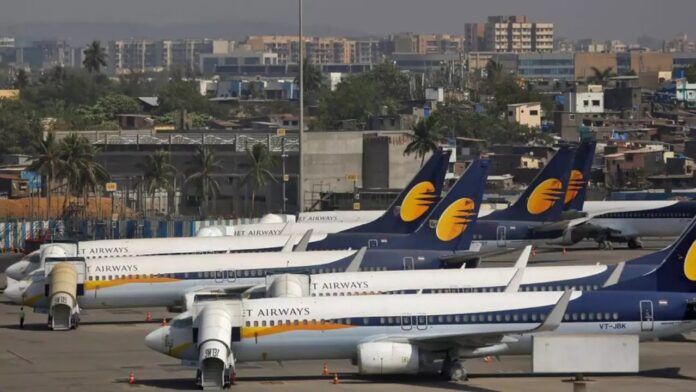The Supreme Court of India has directed the liquidation of Jet Airways, setting aside a ruling by the National Company Law Appellate Tribunal (NCLAT) that had previously upheld the transfer of ownership of the defunct airline to the Jalan-Kalrock Consortium (JKC) under an approved resolution plan. This landmark decision came on November 7, following an appeal by the State Bank of India (SBI) and other creditors of Jet Airways, who have questioned the viability of JKC’s revival plan for the airline.
The Legal Dispute Over Ownership and Resolution Plans
Jet Airways, once one of India’s largest airlines, has been embroiled in financial turmoil and legal proceedings since it was grounded in 2019 due to overwhelming debts. Following its collapse, the airline’s creditors, led by SBI, initiated insolvency proceedings, hoping to recover funds through the National Company Law Tribunal (NCLT) in Mumbai. After a lengthy bidding process, the consortium comprising UAE-based businessman Murari Lal Jalan and Florian Fritsch, an investor with Kalrock Capital Partners, emerged as the winning bidder in 2021, proposing a revival plan for Jet Airways.
Under the resolution plan, JKC committed to infusing substantial capital to revive Jet Airways. However, according to the Supreme Court’s recent ruling, the consortium failed to inject even the first tranche of funds within the specified time, a key obligation outlined in the resolution plan. As a result, the court rescinded the plan and directed the liquidation of Jet Airways, marking the end of an extensive and complex legal battle over the airline’s ownership and future.
Supreme Court’s Decision and Forfeiture of Bank Guarantee
The Supreme Court bench, led by Chief Justice of India DY Chandrachud, who is due to retire shortly, delivered the verdict, which had been reserved on October 16. The three-judge panel not only set aside the NCLAT’s ruling but also ordered the forfeiture of a Rs 150 crore bank guarantee submitted by JKC as part of its bid. This financial penalty underscores the court’s stance that JKC failed to meet its commitments as per the approved resolution plan, further straining relations between the consortium and the airline’s creditors.
The creditors’ committee (CoC) of Jet Airways, comprising various lenders led by SBI, had urged the Supreme Court to exercise its powers under Article 142 of the Indian Constitution to order Jet Airways’ liquidation. The committee argued that the consortium’s failure to honor its financial commitments posed a significant risk to the recovery of their dues. The Supreme Court’s decision reflects its consideration of these arguments, siding with the creditors’ interests over the consortium’s claims.
The Role of the Committee of Creditors and Concerns Over JKC’s Commitment
The CoC, which played a pivotal role in selecting JKC as the winning bidder, had raised multiple concerns about the consortium’s ability to execute the revival plan. Earlier this year, the Supreme Court had ordered JKC to deposit Rs 150 crore into an escrow account jointly managed by SBI and the consortium, emphasizing the legal consequences of failing to comply. This bank guarantee was intended as a show of JKC’s commitment to infusing funds for the airline’s revival, and the consortium had agreed to bring in Rs 350 crore as equity as part of the plan.
Despite the NCLAT’s approval of an adjustment that allowed Rs 150 crore from the performance bank guarantee to be counted toward this Rs 350 crore infusion, the consortium did not meet other critical financial and operational commitments. According to the CoC, JKC had initially promised to pay Rs 100 crore by August 31 of the previous year and another Rs 100 crore by September 30, 2023, but failed to follow through. This lack of compliance with the stipulated timelines for fund infusion became a significant sticking point, prompting the lenders to seek redress from the courts.
Disputes Over Operational Requirements and Additional Costs
One of the crucial points raised by the lenders in opposition to JKC’s bid was the consortium’s failure to secure an international travel permit, which is contingent on an airline maintaining a fleet of at least 20 aircraft. As of the most recent hearings, JKC had only managed to procure five aircraft, falling short of the regulatory requirements necessary to operate international flights. Senior advocate Harish Salve, representing the lenders, argued that the entire process of trying to revive Jet Airways had become “a joke” due to the consortium’s lack of resources and inability to fulfill essential requirements.
In addition to operational concerns, lenders pointed out the mounting expenses associated with maintaining Jet Airways in a state of readiness for a revival that appeared increasingly unlikely. The CoC revealed that they were incurring monthly expenses of Rs 22 crore to cover airport dues and other costs. To date, the creditors have reportedly spent over Rs 350 crore in maintenance and dues, without seeing any meaningful progress toward the airline’s revival.
JKC’s Defense and Their Financial Commitment
JKC’s legal team, led by senior advocate Mukul Rohatgi, disputed the creditors’ allegations, asserting that the consortium had made significant financial contributions to Jet Airways’ revival. Rohatgi claimed that JKC had already spent Rs 700 crore on various efforts to restore the airline to operational status. He argued that the lenders were obstructing JKC’s attempts at revival by challenging every move the consortium made.
According to JKC, they had never requested an adjustment on the payment of Rs 350 crore and were prepared to meet their financial obligations. The consortium contended that the CoC’s resistance to transferring ownership had stalled the entire process, despite JKC’s efforts and investments. Rohatgi’s defense highlighted JKC’s perspective that they had remained committed to the revival plan despite facing opposition from the creditors at every turn.
NCLAT’s Initial Approval and Supreme Court’s Intervention
In March 2023, the NCLAT had upheld the NCLT’s earlier decision to transfer ownership of Jet Airways to JKC. This ruling had directed the creditors to finalize the ownership transfer within a 90-day period and mandated that JKC obtain an air operator’s certificate (AOC) to resume operations within this timeframe. However, the CoC appealed to the Supreme Court, questioning the consortium’s commitment and seeking clarity on several unresolved issues surrounding JKC’s financial and operational plans.
Earlier in the year, the Supreme Court had ordered the consortium to deposit Rs 150 crore in a bank account jointly managed with SBI, making it clear that failing to meet this requirement would result in serious consequences. Ultimately, the apex court intervened, deciding to reverse the NCLAT’s ruling and order the airline’s liquidation, considering it in the best interest of the creditors.
Jet Airways Long Road to Liquidation and the Consortium’s Failed Revival
Jet Airways has faced an arduous journey since its grounding in 2019. Initially celebrated as one of India’s premier airlines, it struggled with escalating debts, leading to its insolvency proceedings. The Jalan-Kalrock Consortium emerged as the winning bidder to rescue the airline in 2021, but delays in fund infusion and other compliance issues cast a shadow over the revival plan’s feasibility.
The consortium, led by Murari Lal Jalan and Florian Fritsch of Kalrock Capital Partners, initially presented a promising vision for Jet Airways’ comeback, including the sale of three Boeing 777-300 aircraft through a Malta-based Challenge Group. This sale was intended to generate much-needed funds to offset some of the airline’s liabilities. However, the sale process faced its own setbacks, with disputes over the ownership and possession of these aircraft. Despite orders from multiple courts, including the Supreme Court, the transfer of the aircraft to Challenge Group remains incomplete.
A Historic Verdict with Broader Implications for Corporate Insolvency
The Supreme Court’s directive to liquidate Jet Airways signals the end of a prolonged and contentious struggle to revive the once-prominent airline. The decision underscores the challenges inherent in India’s corporate insolvency process, particularly in high-stakes cases involving major companies and international stakeholders. The ruling also highlights the importance of adhering to financial commitments in resolution plans and the potential consequences when a winning bidder fails to meet these obligations.
For Jet Airways creditors, the liquidation brings some hope of recovering their dues, although the exact proceeds from the liquidation remain uncertain. The case also sets a precedent for future insolvency proceedings, emphasizing the judiciary’s willingness to prioritize creditor interests over bidders who are unable to fulfill their commitments.
While the Jalan-Kalrock Consortium’s efforts to revive Jet Airways have ended in liquidation, the airline’s legacy and impact on India’s aviation industry will be remembered. As the liquidation process unfolds, the airline’s assets will be sold off to satisfy creditors, closing a chapter in India’s aviation history marked by ambition, challenges, and ultimately, an irrevocable decline.





